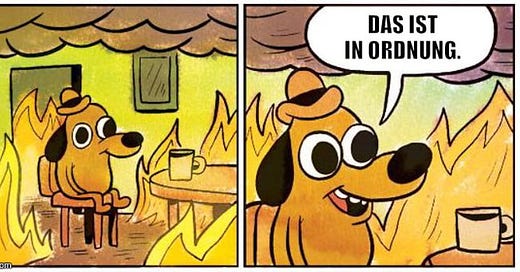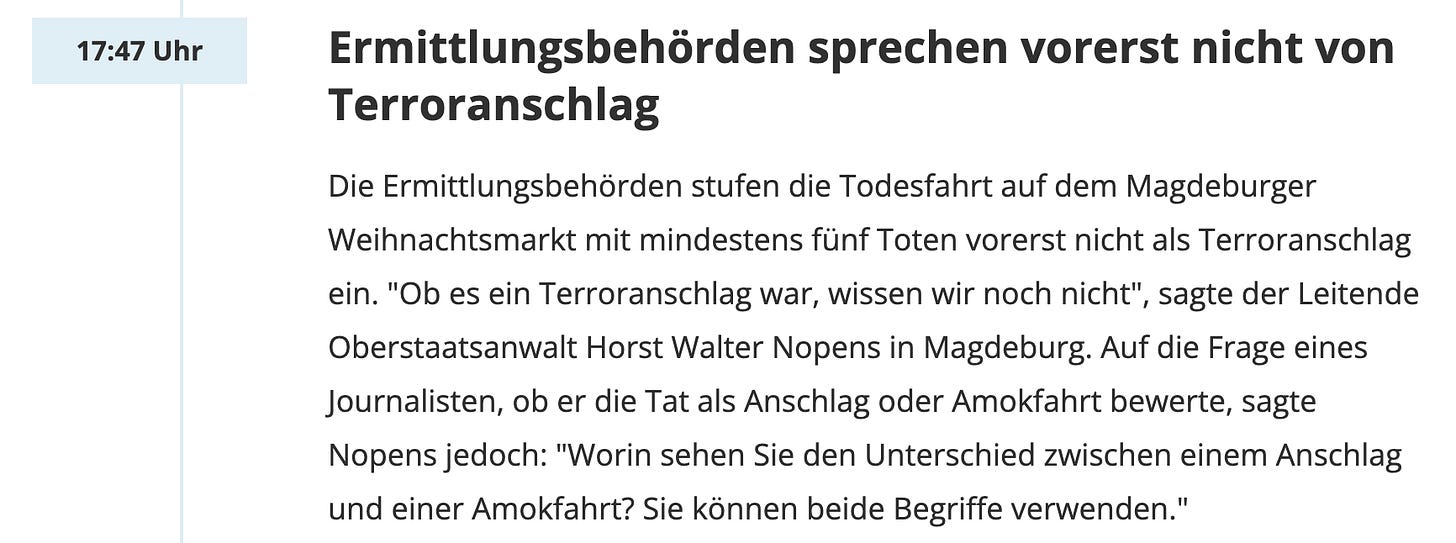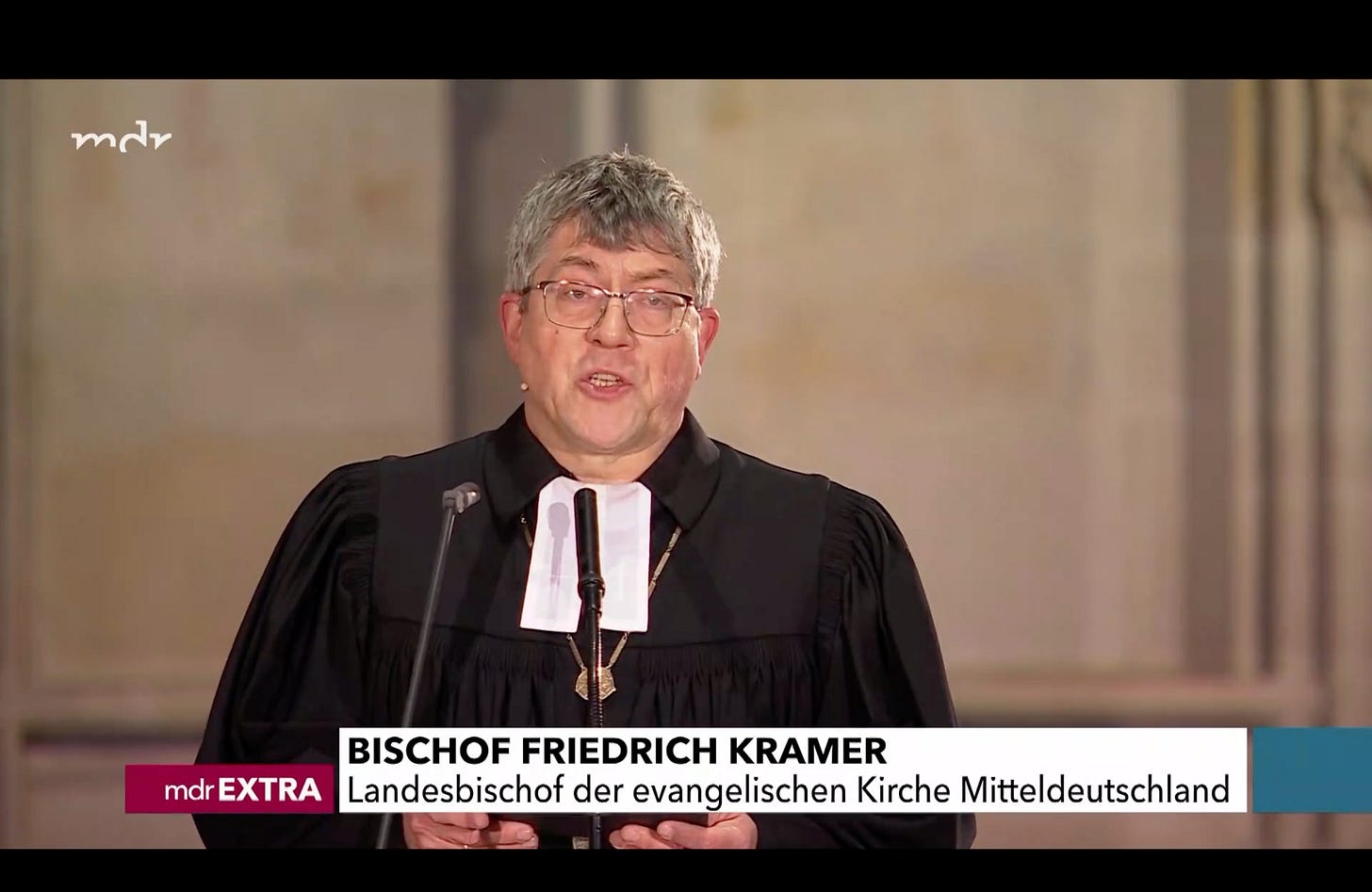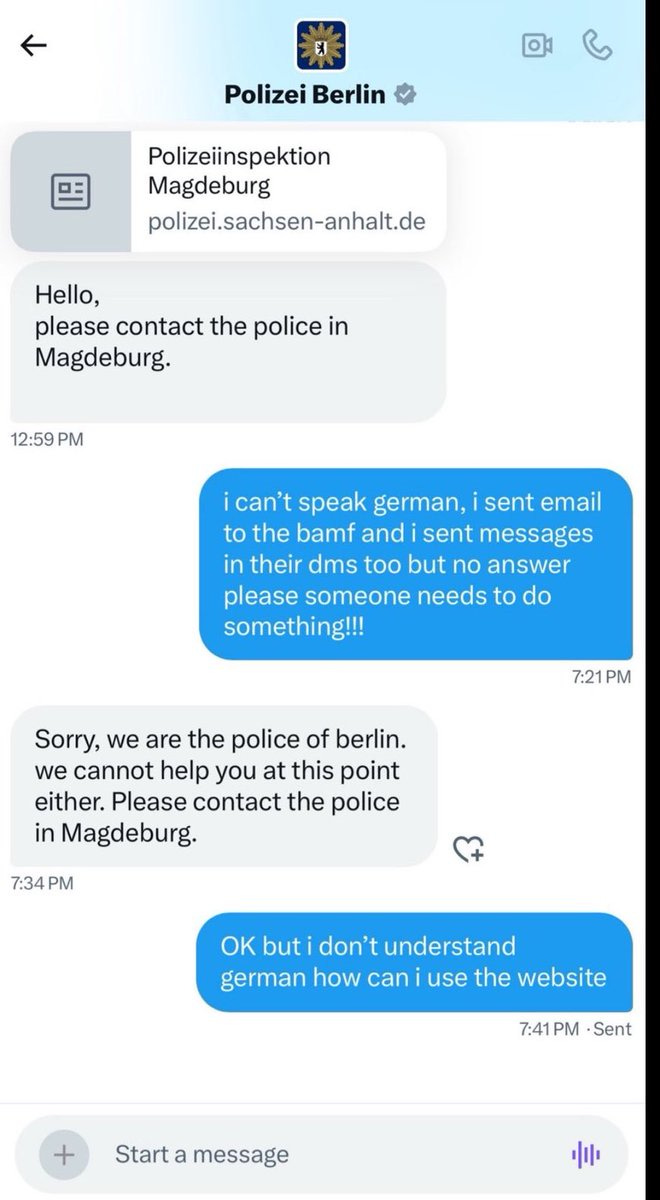Here are some of the ways in which different arms of the German bureaucratic state (politicians, police, religious leaders, the publicly-funded national broadcaster) have responded to Friday’s attack on Magdeburg Christmas Market, which has so far claimed the lives of one child and four women and left over 200 people injured, 40 critically. Translations by me and DeepL. Commentary by me in brackets.
Investigating authorities do not currently consider this to be a terrorist attack
For the time being, the investigating authorities are not classifying the death drive at the Magdeburg Christmas market with at least five fatalities as a terrorist attack. ‘We don't yet know whether it was a terrorist attack,’ said Horst Walter Nopens, Chief Public Prosecutor in Magdeburg. However, when asked by a journalist whether he categorised the crime as an attack or a rampage, Nopens said: ‘What do you see as the difference between an attack and a rampage? You can use both terms.’ (Oh, OK. So a mentally ill Saudi refugee deliberately driving a car at very high speed through a busy Christmas market in provincial eastern Germany isn’t a terrorist attack. Good to know!)
Saxony-Anhalt's Interior Minister defends security concept
Saxony-Anhalt's Interior Minister Tamara Zieschang has defended the security concept for Magdeburg’s Christmas market. The Christian Democratic Union politician told [state broadcaster] MDR Saxony-Anhalt that the market had been secured with concrete blocks. ‘But we can't totally encase our Christmas markets in concrete’. According to her, the state authorities used their legal powers to preemptively check people’s bags and rucksacks. The aim was to enforce the ban on weapons and knives at Christmas markets. This was associated with a high police presence at all Christmas markets. Zieschang emphasised: ‘I believe that this also contributed to the fact that the perpetrator was caught within three minutes.’ (Yes. AFTER committing a mass casualty attack, which was only possible because a large gap had been left in the ring of concrete blocks surrounding the market in order to allow access by emergency vehicles. This defeats the entire purpose of enclosing outdoor public events with concrete blocks to prevent vehicle attacks.)
Experts such as radicalisation researcher Hans Goldenbaum consider the alleged perpetrator to be more of a right-wing radical and against Islam. Goldenbaum told MDR on Saturday that the man adhered to central narratives of right-wing extremism. These are the narrative of an alleged Great Replacement, that Western societies are being foreignised by an influx of migrants, and the claim that an Islamisation of European societies is underway. (Yes, of course the Great Replacement is a conspiracy theory. But when Germany has the world’s lowest birthrate and is Europe’s number one destination for migrants – particularly migrants from the Greater Middle East since 2015 – it is defacto happening. This is not a “far-right narrative”; it only becomes one if you ridiculously assert that it’s somehow all planned and that shadowy figures – the Rothschilds! George Soros! Lisa Scott-Lee! – are directing it all. It is not planned. It is a product of weakness; false tolerance; the amount of money Germany gives asylum seekers – which is higher than the average wage in dozens of third-world countries and thus a huge pull factor, on top of free accommodation; legalism and bureaucracy that makes it extremely difficult to push people back at the border and to deport failed asylum seekers and those with criminal convictions; the huge backlog in processing asylum claims, which means that vast numbers of undocumented people are allowed to remain in Germany for years before their claims are even looked at; and the deep desire of the German professional-managerial class to be seen as the good guys and virtue-signal their country’s security, achievements and demographic basis away, including jeopardising the country’s many existing examples of successful integration, such as through the ongoing rapid and uncontrolled Arabisation of Turkish/Balkan districts and other diverse neighborhoods in German major cities.)
Bishop Friedrich Kramer, State Bishop of the Evangelical Church of Germany in Central Germany, at the memorial service in Magdeburg Cathedral:
“We’re devastated and ask ourselves, are there still any safe places?” (Yeah. They’re called Denmark, Poland, the Czech Republic, Finland, Portugal, Romania, Slovakia, Hungary, Japan, South Korea, the Baltics, the Balkans... or Germany fifteen years ago. You know, basically any developed country in Europe where this never happens because they don’t have a government policy of mass unskilled migration from the Greater Middle East, which is a really weird thing to have.)
“Where is a safe place, a place of peace, that nobody will destroy?” (It’s called Magdeburg in 2012. I was there that year. It was probably one of the safest places in the world. I had lunch in the shopping centre where healthcare workers spent Friday night triaging injured members of the public. It was a totally boring and unremarkable city, Germany’s sleepiest state capital, known for not exactly being a tourist destination and for being the kind of place where nothing ever happens.)
“How do we explain what happened to our children? A child being run over by a car at the Christmas market. How can we talk about it without stoking fears or falling into hate and anger?” (Surely it’s the attack itself that is fear-inducing? It’s totally rational to be afraid of things like this because it keeps happening and nothing is really being done to stop it, and it doesn’t happen in neighboring European countries that don’t accept so many asylum seekers, have border control, and/or don’t have policies encouring mass immigration from the Greater Middle East. Yes, how can we talk about a mass casualty event that injured over 200 people without stoking fears? We wouldn’t want anyone to be frightened. Goodness.
As to hate and anger: surely when members of the public in what used to be one of the world’s safest countries are repeatedly slaughtered by introduced foreign elements, a certain degree of hate and anger is an appropriate response – not towards foreigners, Muslims or asylum seekers in general, but towards the politicians who have facilitated Germany’s transformation into a feral nightmare and everyone else who has promoted and profited from it?)
“So what about those protected spaces, places where I am free from violence? It’s a question that preoccupies us. The most important place of peace that you can preserve is in your heart. Don’t open it to hate speech and violence. Keep it soft. Keep it sensitive. Keep it a place of peace. And when your heart is a place of peace, the spaces of peace can open up again, we can treat each other peacefully, and we can wish each other peace in spaces like this one.” (Okay. So I guess I’ll live and work and socialise in my heart now. Thanks for the tip.)
In late summer last year, we at the German Federal Office for Migration and Refugees received a tip-off via our social media channels regarding the Magdeburg suspect. We took this seriously, just as we do with the many other tip-offs we receive. But as we are not an investigating authority, we told the person to contact the responsible authorities themselves, as is usual in such cases. (In other words, having been warned that the man was planning a mass casualty attack, instead of forwarding this information on to the police, we told the girl in Saudi Arabia who doesn’t speak German to do this herself. Not our problem!)
(Same thing again. The girl contacts Berlin police. Instead of forwarding the information on, they tell her to contact Magdeburg local police. From Saudi Arabia.)
On the same day as the Magdeburg attack, a man of likely Arab heritage who is still on the run attacked someone with a knife in the middle of Saarbrücken while shouting “Allahu akhbar”, three men of Middle-Eastern appearance robbed a fast food restaurant at knifepoint in the city of Essen, an 18-year-old Turkish citizen robbed a young couple at knifepoint in the centre of Mannheim, and two Libyans had a knife fight in the provincial east German town of Lößnitz. The next day, yesterday, a drunk asylum seeker tried to stab another asylum seeker to death in a refugee centre in a Bavarian village. But you won’t hear about any of this constant undercurrent of imported violence in international or even national news, just in police press releases and German local media outlets.
Merry Christmas.











'Paralysed' is the perfect word here. My social circle isn't even mentioning this. Somebody says 'Christmas market' in an innocent context, then a beat, a shadow passes over the conversation, but nobody's saying anything.
(Also the B&R open thread is missing you Wolfstar come back)